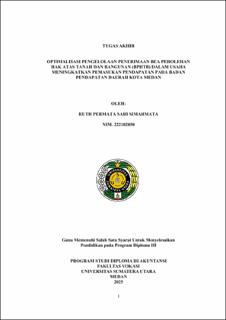| dc.description.abstract | One viable alternative for regional governments to secure funding sources
is through the taxation sector, which serves as a crucial component in financing
autonomous development. Given Medan City's potential as an industrial hub, there
exists a significant opportunity in land and building transactions. Consequently,
the Medan Regional Revenue Agency (Bapenda Medan) can further optimize
revenue, particularly from the Land and Building Rights Acquisition Duty
(BPHTB).This study aims to illustrate the optimization of BPHTB revenue and its
contribution to enhancing regional financial capacity. The issues addressed include
the optimization of BPHTB revenue in Medan City through intensification and
extensification, developments in BPHTB management, and the influencing factors.
The research seeks to describe and evaluate the optimization measures for BPHTB
collection, revenue developments, and their influencing factors. Data collection
methods employed include interviews, observations, and documentation.The
findings indicate that BPHTB revenue optimization in Medan City has been pursued
through several intensification measures, such as public outreach programs,
organizational restructuring, improvements in collection systems, implementation
of online-based computerization, supervision and audits, as well as coordination in
BPHTB procedural controls. Additionally, extensification efforts have been
undertaken to create new tax objects. However, the effectiveness of these measures
is still influenced by various factors, including low public awareness of BPHTB,
instability in BPHTB revenue, lack of public tax compliance, minimal supervision,
and low taxable object values.Based on the average achievement of BPHTB
revenue targets from 2022 to 2024, BPHTB revenue reached between 12.7% and
14.0% of the target, despite existing instabilities. In terms of its contribution,
BPHTB accounted for approximately 1% to 1.12% of the total regional revenue.
Therefore, it is anticipated that Bapenda Medan can more accurately assess
BPHTB potential and strengthen ongoing efforts, so that BPHTB revenue can make
a more substantial contribution to regional finances. This is expected to support the
implementation of governance based on Regional autonomy and accelerate
development in Medan City. | en_US |


